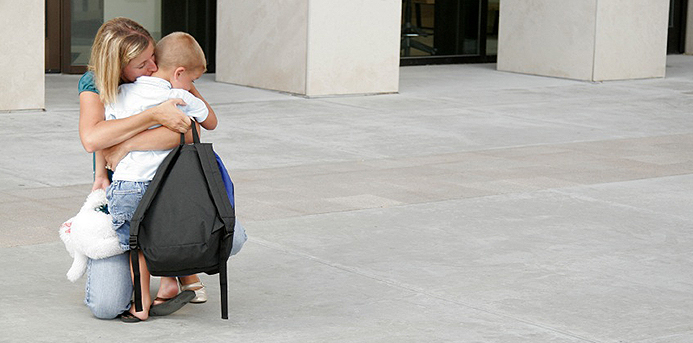At the end of the summer and the start of a new school year, fears loom large for parents with children about to start preschool – how will they deal with their child’s separation anxiety at the classroom door?
Parents imagine their children feeling all kinds of scared, not wanting to be left without mom or dad in a strange, new place. This is an almost universal concern.
This is also an almost universally misplaced concern. Parents’ anxiety about separating from their child is usually the greater problem.
Thanks to decades of experience and studies, experts agree – parents should focus more on their own separation anxiety than on that of their child.
According to leading early childhood development experts, by preschool age, most children are developmentally ready to separate from their parents. (Please note, after launching six children into nursery school, I’m an expert, too – mainly because I learned the hard way, by doing everything wrong.)
As Montessori curriculum explains, “Early childhood … is the age of development of one’s own independence and mastery of one’s own environment … [A child’s] curiosity is in full bloom.” Children’s natural curiosity overcomes normal anxiety. The following recommendations are designed to help parents overcome their own separation anxiety.
Trust the teacher’s assessments and requests. They’re well trained to help with authentic separation anxiety.
Preschools vary on the techniques they use to separate incoming students and parents. But, each school’s staff knows what works for their educational environment. Teachers are well trained to quickly identify children with authentic anxiety and ask their parents to standby in or near the classroom.
When the teacher invites you to leave, skedaddle quickly. And, please don’t be like me – technically leaving the classroom, but lingering near the glass door or windows where I could see my child in action (and he could see me looking concerned). Likely, my hovering presence slowed their development by at least as long.
Your child will stop crying within three minutes of your departure and your few hours away are not as long as you think; enjoy “Me Time.”
When your teacher asks you to leave, even if your child is crying and clinging to your leg, excuse yourself quickly. The teacher will engage your child in fun classroom activities and the tears will disappear soon after you do.
Likely, you’ll have a long to-do list. Don’t even think about tackling it. The next few hours won’t be enough time to get much done. Most chores can be done with your child anyway. Instead, do something just for you.
When you return happy and relaxed for pick-up, you will be much better prepared to provide the loving attention your child will need to help him or her process the day’s new experiences.
As the overachieving, over-organized mom I mistakenly aspired to be, I missed out on a lot of good living because my to-do list was always ridiculously long and I felt guilty when I wasn’t “working.”
Turn off the guilt. It’s harmful to you and your child.
Please don’t operate on guilt either. Guilt only aggravates potential anxiety – yours or your child’s. I learned this the hard way. I felt guilt when I wasn’t with my child, guilt because I gave up a good career, guilt when I wasn’t being productive. That guilt robbed me of a lot of potentially good moments and relationships, and certainly did not make me a better mother when my child walked out of preschool and back into my arms.
Your child will develop friends when they are ready. Before that, parallel play is just fine.
“Mastering their environment” is hard work for a preschooler. This includes playing with words and things, problem solving, becoming less physically dependent on adults, and exploring new sights, sounds and sensations. It’s not unusual for children to focus most of their attention on these areas before they start to form strong relationships with other children.
Therefore, don’t feel anxious about whether or not your preschooler develops friends at school. They will likely play alongside other kids – parallel play – before they will start to play with them.
It took my oldest months to get to the point where he would engaged in extended parallel play (probably because I hovered anxiously). His astute teacher pointed out when this finally happened and recommended that I organize a play date with the other boy and his mother, a wise and relaxed mom who became and remains a good friend and mothering mentor.
The other preschool parents have the potential to become your lifelong friends. Engage with and enjoy them and your child will likely be happier and make more friends, too.
Great friendships often form over the heads of our children. Talk about shared interests! Your focus on making a new friend will be healthier than nurturing anxiety, and seeing you happily connect with others makes it easier for your child to do so in the classroom.
Don’t let insecurities or competitiveness rule your actions. Everyone else really isn’t a better parent than you and their children aren’t destined to be more successful than yours. Turn off your critical brain and look around with love.
Parenting isn’t a competition; it’s a gift. Every moment spent comparing and worrying is a wasted moment. Focus on how to grow the good that this gift brings instead.
Learn how to successfully deal with preschool separation anxiety and you will reap rewards the rest of your life. You’ll be better prepared to meet the many challenges and potential anxieties your growing child will present for years to come.
More from Make It Better:

